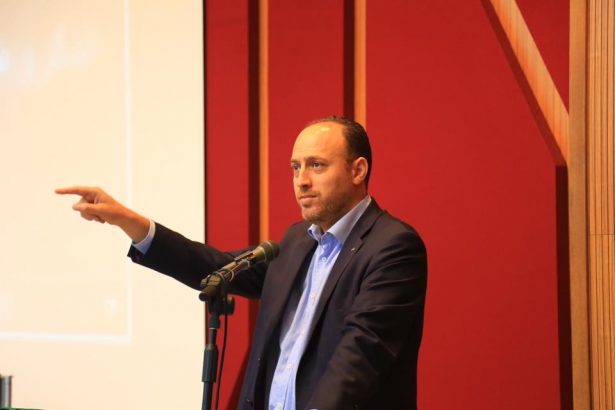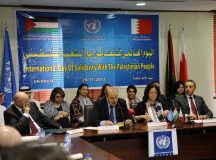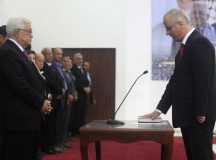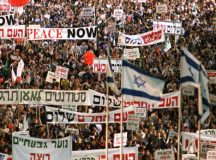Husam Zomlot serves as ambassador-at-large for the state of Palestine and adjunct professor of Government at Birzeit University. He is founder and co-ordinator of the Palestine Strategy Group and served as a PLO representative to the UK from 2003 to 2008 and the author of Building a Palestinian State Under Occupation. In this essay he explores the crisis of the Oslo peace process, the changing character of the parties to the conflict, and the new Palestinian strategy which he argues is based on internationalisation, gradualism and non-violence.
Since 1988 the Palestinian strategy to resolve the Israeli-Palestinian conflict has been to pursue a negotiated two-state solution with the United States acting as the advocate and broker. However, this strategy has failed and we are living with the consequences of that failure. Our task is to face up to that fact and develop a new strategy.
The Palestinian Authority
The Palestinian Authority (PA) was established for a specific purpose: to fulfil the Oslo Accords. Interim arrangements were supposed to last for five years during which the PA was to take responsibility for service delivery to the population – education, health, police, etc. – followed by a gradual transfer of authority from Israeli control to the PA. But there has been no wider transfer of authority. The process is frozen and has now outstayed its welcome – by 17 extra years! Palestinians must ask: when we consider our strategic objective of statehood, is the PA now a net burden or a net asset?
My answer is that the PA is a net asset. Of course, everything we do is to secure our legitimate political aspirations, and if we do not see movement towards that end, then we should revise, reconsider, and reorient our strategy. But no nation on earth seeking independence dissolves its national institutions. Once we reform those institutions we will be able to redefine the relationship between them and Israel. Also, Israel has other plans for the Palestinians, and all of them are worse than a not-fully-functioning PA.
But we have to acknowledge that the political purpose of the security coordination agreed to at Oslo has been lost. It was never supposed to be security for its own sake, quiet for quiet. It was supposed to be peace for land; security for gradual withdrawal. We do coordinate and we do it well; every Israeli general says so. But the heart of security coordination was supposed to be ‘you don’t come to my area, I don’t come to yours’. The permanent-interim character of Oslo however, means that, for example, the Israelis were in my neighbourhood recently, which is the heart of Ramallah. They had to apologise to President Mahmoud Abbas because Abbas’s guards found Israeli soldiers in his garden! They come into Area A and Area B – our sovereignty has collapsed.
Nonetheless, we should not dissolve the PA. It has taken a huge effort and a huge investment of time and money – billions of dollars – to get our institutions to this level. Thousands of people of good will have helped us. And our institutions are not bad in the civil sphere. In the security sphere they are among the best in the region, which is why we have relative stability. But Israel is taking us for granted, now. There must be conditionality, responsibility and reciprocity.
The PA needs to consider changes. Of course civil cooperation is needed when somebody has a heart attack and we have to send them to an Israeli hospital, or there is an Israeli fire and they seek our fireman. And of course, the ministry of interior affairs will police the West Bank.
The PA should not be dissolved but we should establish two red lines: we don’t do things for free and we don’t do things for a non-political aim. Everything we do must be for our legitimate national-political aspirations. If we don’t see movement towards that end, then we should revise our thinking and reorient our strategy.
Palestinian Strategy Today
That’s why since 2010 there has been a major effort to regain the initiative of the peace process.
Two words describe our approach: gradualism and non-violence. This approach was chosen to redefine the relationship with Israel and to focus on pressure points for change.
Fatah is the biggest movement in the Palestinian Liberation Organisation (PLO), and has responsibilities: to reinstate a functioning political system, to lead a democratic renewal, and to seriously think about how to end occupation and fulfil Palestinian historic rights. We have to be patient, adopt a long term perspective and understand that there is no ‘knockout’ blow available to end the occupation. It will be a cumulative process, incremental and constructive.
The battle is not going to be won via military engagement. ‘Popular resistance’ however, can succeed; peaceful, non-violent resistance. By engaging the occupation in a popular and peaceful way, this strategy retains the moral high ground and maximises international support for the Palestinians.
But this long term strategy is also realistic. Everywhere, public opinion is shifting. At a speaking engagement in the US recently, I learned how the younger generation of American Jews are changing their identity and have a very different relationship with Israel than their parents and grandparents had.
The biggest battle Palestinians face is, in a word, staying. Standing steadfast is not easy. For example, the PLO negotiation department recently arranged a tour of diplomats and media to the E1 area between East Jerusalem and Ma’ale Adumim, to inspect the settlement plan, and even I was shocked by what is happening there. The E1 plan is an Israeli plan to settle in a stretch of the West Bank from East Jerusalem to Jericho, cutting the future Palestinian state in two. The US opposes it strongly. And yet that plan is unfolding.
For the last 22 years we have been thinking that ending the occupation is a Palestinian-Israeli responsibility. We need fresh thinking: building a functioning political system, building a viable and sustainable Palestinian economy, and staying on the land; all that is our responsibility. But ending the occupation is now also an international responsibility.
The Americans are not enough
The one successful United States intervention in the Israeli-Palestinian conflict was during a Republican administration. That’s why, when we Palestinians are asked whether we prefer the Democrats or the Republicans, we reply: ‘We have no preference as to party; our preference is reserved for policy.’ We miss the Republicans James Baker and George H.W. Bush because they told Israel: ‘Our advice comes with money: you are not taking the money without the advice.’ Is America ready to pressure Israel in pursuit of its own stated policy? That’s the real question. History tells us that Israel only makes concessions under pressure. Pressure works on Israel like it does for everyone else.
Ours is a very long term project and we know it will take time to change the US political scene. Palestinians understand that the US will continue to remain the most important partner for Israel. The Palestinians accept and support US policy – the two-state solution; the illegality and illegitimacy of the settlements inside the 1967 borders; the need to establish two states who live in peace with each other. However, the administration’s policy, and the successive involvements in the peace process, is not supported by US politics: that’s the bottom line. And US politics is not about to change dramatically. If anything, it is going in the wrong direction. So we have to think seriously about the limits of the role of the US. Also, we need to engage the Jewish communities in the US. J Street, for example, is growing and providing a different, organised Jewish voice in Washington – an alternative to the American Israel Public Affairs Committee (AIPAC). Either we engage over the long term with these communities, or we give up the idea that the US can be the sole sponsor of the peace process.
Time for the International Community to step up
The US alone will be unable to bring the Israelis and Palestinians to an agreed settlement. A coordinated international effort is needed. Could the model used to conclude difficult negotiations with Iran by the P5+1 (US, Russia, UK, France, China + Germany) powers be applied to the Israel-Palestinian conflict? Those negotiations succeeded for four reasons. First, the final destination was decided a priori. Iran was made to face a choice: receive sanctions relief or continue towards a nuclear weapons capability. The Iranian people had already chosen the former by electing President Hassan Rouhani. By contrast, Israel has not been required to recognise the final destination, and it can be both nuclear and occupy another nation. Second, the Iran negotiations worked because there was a clear timetable and a date by which the negotiations would end. By contrast, the Oslo agreement was open-ended. It is over 20 years since Oslo, so what does it mean when we say we are in the Oslo process? Third, Iran was not allowed to build its nuclear capability during negotiations, while Israel is allowed to colonise and dramatically change facts on the ground during talks. Finally, negotiations with Iran were international, and Europe played a decisive role.
Hamas is a symbol of our failure
Convincing our international partners to apply meaningful pressure on Israel is difficult. One of our problems is Hamas, who are a domestic Palestinian phenomenon, whether we like it or not. We need to understand that today there are many political parties in the region that are based on religion, and Hamas is one of them. It has mobilised individuals who see Islam as a legitimate part of the system of governance, and if Hamas were to lose its appeal, another group would likely come along and capture those individuals. The only way to deal with Hamas is to integrate them into the political system.
Hamas is, in a sense, the symbol of the failure of Oslo and of our failure in the PLO to deliver the two-state solution. In the absence of a political horizon, people across the region are reverting to religion. The main blame lies with the secular movements in the Arab world who have failed to establish a popular and democratic alternative model of governance.
Israel has moved
Our strategy is shaped also by the fact that three forces have transformed the Israeli political and social landscape during the Oslo years. The first is the settler movement, now a key political player in Israel. The settler movement was manufactured and protected by the State: there would not be one settlement in the West Bank and East Jerusalem if the state had not sponsored it and provided it with protection and infrastructure. But now the settler movement is a monster that Israel cannot control. It is prepared to fight the State that created it in order to secure its interests as it sees them.
Today, the main roads in the West Bank are for the settlements not for the Palestinian cities. Drive from Ramallah to Hebron or Jenin and you find the big signposts are all in Hebrew. We Palestinians use the bypass roads. Remember, the term ‘bypass roads’ used to be for settlers to avoid Palestinian major cities – Ramallah, Hebron and Jenin. Today, we use the bypass roads because the settlers have the highways.
In time, the settlers gave birth to the so-called ‘hilltop youth’. Their strategy is: the State will continue sponsoring us in the main settlements, in what Israel calls legal settlements, but we will go beyond the State and occupy every hilltop possible to block the possibility of any Israeli government pursuing the two-state solution. The hilltops of the West Bank are strategic. And in a few years settlers have managed to occupy almost every hill in the West Bank. They discovered that although Israeli society may call these settlements ‘illegal outposts’, it would continue to give them protection, services and infrastructure. From 2014 they started to employ sabotage. And now there are killings. These settlers have a very clear agenda: they are telling the Israeli government, ‘Okay, you have your State, and we have our State here, in Judea and Samaria.’
The second force that has transformed Israel is the arrival of over a million Russian immigrants since 1991. The majority of these immigrants migrated to Israel because there are more jobs and a better standard of living there. But many Russians who came primarily for economic reasons then defined themselves politically as extreme right because that was their ticket into the political landscape.
The third force transforming Israel is the orthodox community – the fastest growing demographic of Israeli society today. Although the orthodox community were not part of the political system in the past, they are now integrating themselves and shaping the coalitions that emerge from elections.
We must avoid this conflict becoming a religious one. If it’s to be ‘my God versus your God,’ then that’s Armageddon. Our task is not to stop religion per se but to ‘de-religionise’ politics. Netanyahu’s government has allowed the ‘religionisation’ of politics in Israel. Parts of the current Israeli government are defining sovereignty not on the basis of national collective rights, but on ‘god-given’ religious definitions. It remains unclear if Netanyahu’s government can backtrack.
After Abbas: democratic renewal and national unity
A discussion of the future of Palestinian politics should not be a discussion of names. It should be about renewing the democratic process, which has been frozen for a long time. The most important thing is that the Palestinian people elect the next president and that we create mechanisms of accountability and democratic structures that are suited to our situation today – and not of 22 years ago. There are over 20 central committee members and each has the right to suggest himself for the presidency or to nominate people from other committees. If somebody puts the name of Marwan Barghouti forward then, in my opinion, he would be uncontested in terms of his popularity and legitimacy. Opinion polls for many years have told us that Marwan is the personality that could win over Hamas. I personally would support him because we need a popular figure who can beat Hamas in elections and deliver national unity.





































Thank you for publishing this interview. It is important for Israelis, Americans, Brits and other Westerners to hear the voice of a Palestinian leader who stands on the values of secularism, liberalism, democratic institutions, peaceful disobedience, mutual recognition, and coexistence. I’m sure many Israelis will balk at the idea of Barghouti leading the PA (first he would have to be released from Israeli prison where he is serving multiple life sentences) but I see it as no different than Ben-Gurion allowing Begin and Irgun into the Knesset. Reconcilliation is the only path forward and unspeakable acts have been committed by all sides in this ongoing quest for self-determination. Peace is made with one’s enemies not one’s friends and surely the Palestinian Arabs have an equal right to their own state as do Israelis.
You want the occupation to end, recognize Israel as a Jewish state; accept the modified parameters that Clinton offered (you are never going to get Jerusalem or the settlement blocs and Israel will never give up strategic geography ever again), sadly your leadership rejected the original Clinton offer of 95% of the territories including parts of Jerusalem as not enough-your loss not ours; stop the antisemitic incitement by your government; and find a way to get rid of Hamas, which by the way is all in your court, nothing to do with Israel. It might also be time for Palestinians to take responsibility for the failures of your own society to live up to the Oslo Accords if they want to be be a successful state.
This article may show how Palestinians think, but it is also delusional and devoid of reality.